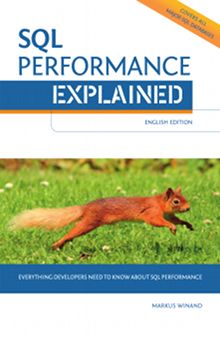To index an IS NULL condition in the Oracle database, the index must have a column that can never be NULL.
That said, it is not enough that there are no NULL entries. The database has to be sure there can never be a NULL entry, otherwise the database must assume that the table has rows that are not in the index.
If you like this page, you might also like …
… to subscribe my mailing lists, get free stickers, buy my book or join a training.
The following index supports the query only if the column LAST_NAME has a NOT NULL constraint:
DROP INDEX emp_dobCREATE INDEX emp_dob_name
ON employees (date_of_birth, last_name)SELECT *
FROM employees
WHERE date_of_birth IS NULLRemoving the NOT NULL constraint renders the index unusable for this query:
ALTER TABLE employees MODIFY last_name NULLSELECT *
FROM employees
WHERE date_of_birth IS NULLTip
A missing NOT NULL constraint can prevent index usage in an Oracle database—especially for count(*) queries.
Besides NOT NULL constraints, the database also knows that constant expressions like in the previous section cannot become NULL.
An index on a user-defined function, however, does not impose a NOT NULL constraint on the index expression:
CREATE OR REPLACE FUNCTION blackbox(id IN NUMBER) RETURN NUMBER
DETERMINISTIC
IS BEGIN
RETURN id;
ENDDROP INDEX emp_dob_nameCREATE INDEX emp_dob_bb
ON employees (date_of_birth, blackbox(employee_id))SELECT *
FROM employees
WHERE date_of_birth IS NULL----------------------------------------------------
| Id | Operation | Name | Rows | Cost |
----------------------------------------------------
| 0 | SELECT STATEMENT | | 1 | 477 |
|* 1 | TABLE ACCESS FULL| EMPLOYEES | 1 | 477 |
----------------------------------------------------The function name BLACKBOX emphasizes the fact that the optimizer has no idea what the function does (see “Case-Insensitive Search Using UPPER or LOWER”). We can see that the function passes the input value straight through, but for the database it is just a function that returns a number. The NOT NULL property of the parameter is lost. Although the index must have all rows, the database does not know that so it cannot use the index for the query.
If you know that the function never returns NULL, as in this example, you can change the query to reflect that:
SELECT *
FROM employees
WHERE date_of_birth IS NULL
AND blackbox(employee_id) IS NOT NULL-------------------------------------------------------------
|Id |Operation | Name | Rows | Cost |
-------------------------------------------------------------
| 0 |SELECT STATEMENT | | 1 | 3 |
| 1 | TABLE ACCESS BY INDEX ROWID| EMPLOYEES | 1 | 3 |
|*2 | INDEX RANGE SCAN | EMP_DOB_BB | 1 | 2 |
-------------------------------------------------------------The extra condition in the where clause is always true and therefore does not change the result. Nevertheless the Oracle database recognizes that you only query rows that must be in the index per definition.
There is, unfortunately, no way to tag a function that never returns NULL but you can move the function call to a virtual column (since 11g) and put a NOT NULL constraint on this column.
ALTER TABLE employees ADD bb_expression
GENERATED ALWAYS AS (blackbox(employee_id)) NOT NULLDROP INDEX emp_dob_bbCREATE INDEX emp_dob_bb
ON employees (date_of_birth, bb_expression)SELECT *
FROM employees
WHERE date_of_birth IS NULL
AND blackbox(employee_id) IS NOT NULL-------------------------------------------------------------
|Id |Operation | Name | Rows | Cost |
-------------------------------------------------------------
| 0 |SELECT STATEMENT | | 1 | 3 |
| 1 | TABLE ACCESS BY INDEX ROWID| EMPLOYEES | 1 | 3 |
|*2 | INDEX RANGE SCAN | EMP_DOB_BB | 1 | 2 |
-------------------------------------------------------------The Oracle database knows that some internal functions only return NULL if NULL is provided as input.
DROP INDEX emp_dob_bbCREATE INDEX emp_dob_upname
ON employees (date_of_birth, upper(last_name))SELECT *
FROM employees
WHERE date_of_birth IS NULL----------------------------------------------------------
|Id |Operation | Name | Cost |
----------------------------------------------------------
| 0 |SELECT STATEMENT | | 3 |
| 1 | TABLE ACCESS BY INDEX ROWID| EMPLOYEES | 3 |
|*2 | INDEX RANGE SCAN | EMP_DOB_UPNAME | 2 |
----------------------------------------------------------The UPPER function preserves the NOT NULL property of the LAST_NAME column. Removing the constraint, however, renders the index unusable:
ALTER TABLE employees MODIFY last_name NULLSELECT *
FROM employees
WHERE date_of_birth IS NULL----------------------------------------------------
| Id | Operation | Name | Rows | Cost |
----------------------------------------------------
| 0 | SELECT STATEMENT | | 1 | 477 |
|* 1 | TABLE ACCESS FULL| EMPLOYEES | 1 | 477 |
----------------------------------------------------
